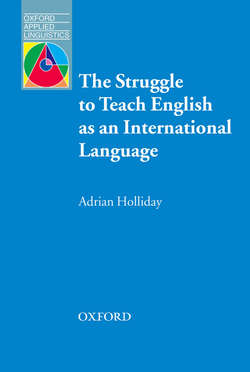The Struggle to Teach English as an International Language

Реклама. ООО «ЛитРес», ИНН: 7719571260.
Оглавление
Adrian Holliday. The Struggle to Teach English as an International Language
Preface and methodology
1 The struggle for new relationships
ESOL educators: the politics of labelling
English as an international language
Two positions
The sites of struggle
2 Culturist perceptions of ‘us’ and ‘them’
The constituents of culturism
A non-essentialist view
Culturism in TESOL
Excavating the strata of culturism
Complex identities
Not a simple matter
3 The legacy of lockstep
A moving, adapting practice
Cultural icons
The residues of audiolingualism
Control and transportable professional confidence
4 ‘Learner-centredness’ and ‘autonomy’
Learner-centredness
Bureaucratization and technicalization in practice
Autonomy, native-speakerism, and culturism
The need to see beyond the ideology
5 Social autonomy and authenticity
Classroom regime as inhibitor
Resistance
Social authenticity
An opening up, and an undoing of prejudice
6 ‘Stakeholder-centredness’
Projects and people
Writing the stakeholders in
Devaluing other realities
Bucking the imperialism thesis
Seeing individual richness
7 Critiquing appropriate methodology
Separating the positive from the negative
‘Our’ system or people
The puzzle of Position 2
8 The struggle for cultural continuity
Correction vs. understanding
Dealing with professional division
Addressing deeper political issues
Understanding other agendas
Working from the inside out
The interpersonal and the global
Loose ends and enriching encounters
Bibliography
Отрывок из книги
The element of struggle in international English language education exists in two respects. It resides in the need for educators to re-align themselves in the face of the changing ownership of English and culturally divisive ideologies and practices. This book explores this struggle by means of a critical sociology of their worlds and conflicts. But the struggle also resides in how it is possible to write about an area of conflict while being situated within it in a position of power and privilege – from an English-speaking West which has dominated the TESOL world with its well-resourced institutions of teaching, training and publishing and the residues of a colonial past. I draw on email accounts from 36 ESOL educators from 14 countries, who include 20 colleagues from outside the English-speaking West. Their accounts have indeed influenced the direction the book has taken – often to unexpected areas of discussion – but their presence raises the issue of who I am to be able to incorporate their voices. Though it may exaggerate an opposition which does not always exist, one must take seriously Canagarajah’s concern about ‘white-skinned teacher/researchers from rich communities’ who ‘visit dilapidated classrooms of brown-skinned vernacular-speaking students in periphery communities’ (1999: 51). It cannot be denied that ‘Centre’ researchers trying to empower ‘Periphery’ communities to which they do not belong may in the end only strengthen the discourses of the ‘Centre’.
There are several factors to consider. First, English-speaking Western TESOL is itself a diverse, divided, and complex culture. The focus of this book is the cultural prejudices which emerge from a dominant, though particular ideology which has its origins within this culture but does not govern the thinking of all its members. A British academic critiquing this ideology is not therefore indulging in self-flagellating soul searching, but struggling for independence from thinking with which he and many of his colleagues do not wish to be associated. Second, cultural distance is relative. One cannot necessarily claim insider understanding of people because they come from one’s own community. Differences of age, class, institutional culture, gender, personal ideology, and so on also mediate in our visions of each other. I am not always in a better position to understand my British colleagues in Canterbury than the Egyptian colleagues I worked with so closely for five years. There is also a broader professional community which in a multiplicity of ways interconnects ESOL educators of all types. Its ideological, political, and economic divisions not so much inhibit cultural study, but characterize the particular coherence of the culture which enlivens my investigation.
.....
Continued discussion and renewed acquaintance with my past colleagues from Ain Shams, Damascus, and Pune Universities, Amal Kary, Mona Zikri, Nafez Shammas, Warka Barmada, Grace Jacob and Maya Narkar, have provided immeasurable inspiration and helped me to completely re-assess my professional persona. More recently, Hollo Dorottya and her acutely aware PhD students at Eötvös Lóránd University, and Doug Goodwin, Ingrid Barradas, Troy Crawford, Martha Lengeling and their colleagues, and students at the School of Languages, Guanajuato University, took me into parts of the world with other stories I had not before experienced. Successive cohorts of students from the Hong Kong Institute of Education have also been influential. Sitting in their refectory on their campus, watching them ‘at home’, has also played a deeply formative role which is detailed within.
Major contribution to my thinking has been made by critical qualitative researchers who have been students and colleagues in Canterbury, Ge Jin, Pat Grounds, Pembe Delikurt, Tom Duan Yuping, Pam Aboshiha, John Kullman, Martin Hyde, Kimberly Brooks-Lewis, Caroline Moore, Oscar Narvaez, Cecilio Lopez, Hiroko Hayagoshi, Jo Chang and Valerie Ainscough. Angela Baxter, Chris Anderson, Jimmy Tong Woonman, and Trevor Grimshaw are referred to at length. Others are among my email informants. I feel we have pushed forward the boundaries of knowledge of TESOL as cultural and political practice. Tony Booth helped me to realize that all experience is data – moving on from Swales’ reference to ‘taking tea in laboratory technicians’ cubby-holes’, hanging out in conferences, noticing things in meetings, classrooms, and departmental corridors. Vivien Zamel, Ruth Spack, Ryuko Kubota, Stephanie Vandrick, and Aya Matsuda helped me to see greater texture in the ideas I had been ruminating over and writing about more parochially for several years. Paul Taylor, a dear friend who was there in many of my sojourns at TESOL, provided a sanity and helped me not to get beyond myself. Chance meetings with Nalina Sutakul helped me to finish the text.
.....